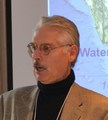PREPARE FOR TOMORROW: Campbell River City Council has adopted its Sea Level Rise strategy

“The strategy is our roadmap for coping with a climate change impact that will profoundly affect the City’s residents, businesses, asset management plan, and capital works projects. Sea Level Rise is a relatively slow-moving phenomenon and will go largely unnoticed most of the time. However, during a storm event, 1 metre of global sea level rise becomes a serious danger for those few critical hours or minutes around high tide,” stated Chris Osborne.










